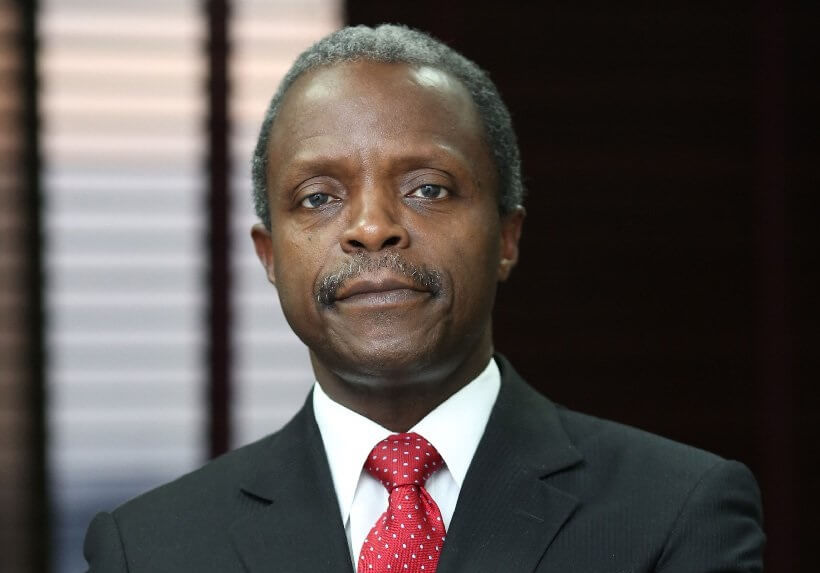Nigerian politics is an endless tableau of actual and symbolic knife fights. The fittest members of the governing species, bellyfullus rex, have instincts and organs keenly adapted for intrigue, opportunism, camouflage, verbal exuberance, blood sport, and self defence. Vice President Yemi Osinbajo, luminary of courtroom warfare, veteran of Lagos political lawfare, and presumed Christian exorcist of demonic malware, will need all his armour to shield himself from being bloodied. The assault on him has been defined by telltale military calculation.
First, there was the aerial decapitation strike which removed him as chairman of the National Economic Council, traditionally a Vice Presidential perch. The relocation of most of his staff away from the Presidential Villa essentially cut off his personnel supply lines, and turned his command centre into a starvation bunker. Detonating a stink bomb, with its odour of innuendo, about his mishandling of ninety billion naira in election funds was ostensibly a disinformation campaign intended to smother public sympathy for his cause. Because and in spite of the fog of war, Osinbajo appeared disoriented and composed enough to threaten a retaliatory courtroom skirmish with one accuser, Timi Frank. Such a kamikaze gambit would have left his legally protected flank open to lethal friendly fire, or an improvised ejection device. This is Nigeria, where a marked man or woman can be ambushed by a single, pointed clause, and judicially mauled to public applause.
Advertisement
The historical record reveals that Nigerian Vice Presidents, for all the immunity conferred by the constitution, have been quite vulnerable to palace conspiracies, vindictive Presidents, and workplace trauma. Briefing papers for incoming Vice Presidents should probably carry health warnings about the actual danger of persecution, and the latent risk of developing a persecution complex. The late Alex Ekwueme, Shagari’s Vice President, was given to deduce that the 1983 coup which overthrew the Second Republic was carried out to foreclose the chance of his emerging as President in 1987. Olusegun Obasanjo was compelled by do or die expediency to kneel before his powerful and ambitious Vice President in order to secure the PDP Presidential ticket in 2003.
In the safety of a second term [and plotting for an unconstitutional third term], Obasanjo unleashed on Abubakar the full force of his legendary malice. He sacked the Vice President’s aides unilaterally, and contrived to have Abubakar disqualified as a candidate in the 2007 elections. Goodluck Jonathan was treated by the cabal surrounding Umaru Yar’Adua as a constitutional nuisance. During the long months of Yar Adua’s ominous absence in Saudi Arabia, the cabal wove elaborate, futile webs of deception and exclusion to keep Vice President Jonathan from assuming the Presidency, even in an acting capacity. A powerful presidential consigliere like Shagari’s Umaru Dikko, or Buhari’s Abba Kyari, and assertive presidential spouses like Turai Yar Adua and Patience Jonathan, by pulling rank on senior elected officials, can dramatise the difference between the nominal holder of high office, and the actual wielder of consequential power. Nothing subverts a democracy more than a shadow government.
Osinbajo was always going to be in an invidious position. He emerged in the 2014 APC primaries as a surprise corrective to an electorally impolitic Mislim- Muslim offering. He was recommended for his position by the fact of being the sorcerers’s apprentice, the sorcerer being Bola Tinubu, who had coveted the role for himself, and presumably still has his sights on the highest office. As protégés in his Lagos fiefdom, Tinubu has always favoured bright technocrats with no independent political bases.
As placeholder Vice President, Osinbajo could be trusted, apparently, not to eat the proverbial yam before his benefactor had gathered enough firewood to roast it. For the clannish inner circle of Buhari, the Vice President would always have to overcome the hint of shadow puppetry in his relationship with Tinubu. Yet his actions during Buhari’s various overseas absences – the approval of Onnoghen as Chief Justice, the sacking of Daura as DG of the DSS, among others – put his executive reflexes tellingly on display. He was the underdog who turned out to have a decisive bite, the faithful understudy who had emerged from the shadows as a masterful performer of the presidential role. In politics it always pays to reckon with what Harold Laski described as ‘the influence of the office on the personality of its holder’. Power inspires.
Advertisement
Becoming Vice President as Osinbajo did meant embracing multiple, contradictory obligations: to the constitution, to Buhari, to Tinubu, and presumably to his own ego. It also meant he would have to navigate the hopes and discontents of several insistent constituencies: good governance advocates who argue that the former Lagos Attorney- General serves in a government cavalier about the rule of law; Christians incensed that the senior pastor has not stood up more forcefully for victims of sectarian violence; Southerners for whom this son of Ogun has seemed like a willing cat’s paw of Northern reactionaries; Yoruba who believe that this omoluabi represents a strategic, now endangered advance on the geopolitical chequer board; and then the thinking classes for whom the professor has been a fitful beacon of intelligent life in Aso Rock.
Osinbajo is inevitably a pawn in a typically Nigerian game of three-dimensional chess whose ultimate prize is the 2023 presidency. The Vice President is not a check on presidential excess, and the balance of power is not weighted in his favour. He is guaranteed succession only by resignation, impeachment, or an act of God. He cannot count on his inheritance.
– Oyongha writes from Lagos ([email protected])
Disclaimer: This article is entirely the opinion of the writer and does not represent the views of The Whistler.



